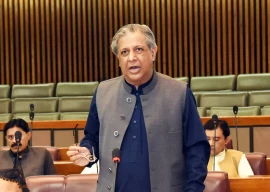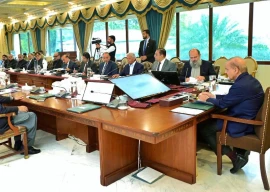
KARACHI:
After nearly 32 years of being listed on the Karachi Stock Exchange, Unilever Pakistan has announced a share buyback programme in preparation to delist itself from all three stock exchanges in the country.
Unilever Overseas Holdings – a wholly-owned subsidiary of London-based Unilever plc – currently owns just over 75% of Unilever Pakistan. The foreign parent is offering Rs9,700 per share – Tuesday’s closing price on the Karachi Stock Exchange – to existing shareholders for their current holdings.
The offering is subject to approval from all three stock exchanges – Karachi, Lahore and Islamabad – on which Unilever Pakistan is listed, following which the company will have 60 days to buy back the shares at its offer price. If it is successful, Unilever Pakistan will become delisted after having traded on the KSE for 32 years. Its initial public offering in Karachi took place in December 1980.
Unilever’s executives in Pakistan said that the move comes as a prelude to Unilever increasing its investment in Pakistan. “The increased stake reaffirms Unilever’s strong commitment to local operations and to Pakistan’s economic potential,” said Ehsan Malik, chairman and CEO of Unilever Pakistan. “Through this process, Unilever Overseas Holdings is actually increasing its investment in the country by a substantial amount.”
Malik declined to specify exactly how much the global parent will be investing in Pakistan. He did, however, clarify that Unilever Pakistan Foods – the global giant’s other subsidiary in the country – would not be affected by the delisting and would continue to trade on the Karachi Stock Exchange.
The news was broadly greeted by the capital markets. “From a macroeconomic standpoint, this transaction would bode well in terms of increase in capital inflow into the country, since the acquisition of shares alone would represent an inflow of $335 million,” wrote Shajar Capital, an investment bank, in a research note sent to clients in response to the news.
Unilever Pakistan’s stock was up the maximum allowed 5%, closing the day at Rs10,185 per share – above the offer price – though volumes remained low. The announcement also appeared to have a broader effect on the food and consumer goods segment of the market, as investors anticipated Unilever’s investments into Pakistan to translate into good news for the sector as a whole. Engro Foods, the most liquid food stock on the market, closed at Rs84.66 per share, up 4.84% for the day.

The rise in stock price, however, may, at least in part, also be due to the sentiment of some investors that the offer price is too low. The rise, therefore, is a means to bid up the stock price and force Unilever – clearly a motivated buyer – to increase its offer price.
“We do not believe the offer accurately reflects the value of the company,” said Mattias Martinsson, CEO of Tundra Fonder, who manages about $40 million in a Pakistan-focused fund based in Stockholm, Sweden. “A comparison with Nestlé Pakistan would indicate that a price 30-50% higher than the Rs9,700 currently offered [would be justified]. We are thus uncertain as to how many shareholders are willing to sell before an independent valuation is conducted.”
Many portfolio managers within Pakistan said they had avoided any exposure to Unilever Pakistan at all, since it is a highly illiquid stock. A look at the company’s latest pattern of shareholding suggests that most of Unilever Pakistan’s other shareholders are individual investors, who may share Martinsson’s view that the current offer price is too low.
And a failed attempt at buying back shares on the Karachi Stock Exchange is not uncommon: the Philippines-based International Container Terminal Services saw its bid to acquire shares in Pakistan International Container Terminal via a similar tender offer fail in early October, largely due to investor sentiment that its offer price was too low. The Manila-based firm had offered Rs150 per share for PICT, which closed trading on Wednesday at Rs195.10 per share.
Unilever executives also brushed off the notion that the share buyback would have any impact on Unilever Pakistan’s operations. Employees at Unilever, who spoke to The Express Tribune on the condition of anonymity, largely confirmed this view, saying that they did not anticipate any major changes from the move, which they said they were notified of earlier this month.
Published in The Express Tribune, November 29th, 2012.



































































COMMENTS
Comments are moderated and generally will be posted if they are on-topic and not abusive.
For more information, please see our Comments FAQ